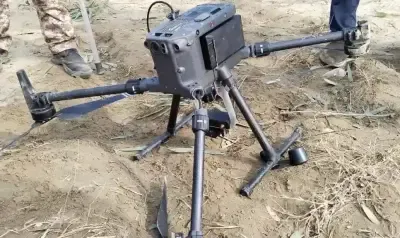Is a drone threat emerging along the India-Bangladesh border?

Synopsis
Key Takeaways
- Security agencies are on high alert due to the sighting of a Chinese-made drone.
- Increased drone activities may lead to illegal infiltration and smuggling operations.
- India has enhanced surveillance efforts along the border.
- Counter-drone systems are being deployed to tackle the threat.
- The acquisition of Bayraktar TB2 drones by Bangladesh raises concerns.
New Delhi, Aug 4 (NationPress) The emergence of a drone along the India-Bangladesh border has raised significant concerns among security agencies. A Chinese-made drone was detected close to the Durgabari Outpost of the Border Security Force (BSF) in the West Tripura district, and it is currently being transported to Delhi for forensic analysis.
The preliminary evaluation indicates that this is not a civilian drone, as it is equipped with two high-resolution cameras.
Intelligence reports suggest a potential increase in drone activities along the India-Bangladesh border. These drones may be utilized by nefarious groups seeking to gather intelligence on the positioning of Indian security forces.
This intelligence could facilitate illegal crossings, as well as the smuggling of cattle, drugs, and counterfeit goods.
Officials highlight that this pattern mirrors previous experiences observed at the Line of Control and the international border with Pakistan, where drones have been spotted in smaller numbers in Punjab and subsequently in Jammu and Kashmir.
Initially, these drones were involved in reconnaissance missions, but they later began delivering arms and narcotics. In the near future, it is anticipated that certain factions within Bangladesh will escalate their use of drones.
The intelligence community believes that given the strained relations between the Bangladeshi government and India, there is a strong possibility of a significant influx of illegal immigrants.
India is not only concerned about the rogue drones operated by anti-social elements. The Bangladeshi military has recently acquired the Turkish-made Bayraktar TB2 drones, which have been conducting surveillance operations close to the Indian border.
The Bayraktar TB2 is an armed unmanned aerial vehicle (UAV) manufactured in Turkey, comprising a TB2 UAV platform, a ground control station, a ground data terminal, a remote display terminal, and advanced base modules.
Encounters with the TB2 drone are not rare, as these have been operational since 2024. Similar drones have also been spotted near Meghalaya, which shares a 443 km border with Bangladesh. Reports indicate unusual drone activities near Shore and Stella in the East Khasi Hills district.
Authorities have cautioned the BSF to prepare for an uptick in such sightings. The primary challenge will be monitoring the drones utilized by the Bangladeshi military and rogue actors. India has already enhanced its surveillance protocols in the area.
Nevertheless, given the evolving situation, security officials will need to intensify their efforts.
India has developed and deployed counter-drone systems to combat the threat posed by rogue drones. These systems employ both soft kill (jamming) and hard kill (destruction) technologies. Solutions such as the DRDO’s D4 system are engineered to detect, track, and neutralize drones.
These counter-drone systems are predominantly located in Jammu and Kashmir and Punjab, regions that border Pakistan. However, with the Bangladeshis adopting similar tactics, comparable measures will need to be implemented along the Indo-Bangladesh border as well.
India recognizes the necessity to invest further in counter-drone research and technology. A policy document released by the Ministry of Civil Aviation in 2019 noted, 'The utilization of armed drones by extremist groups to conduct reconnaissance and target strategic Israeli installations during the Israel-Lebanon war exemplifies the escalation of terrorist and insurgent drone capabilities.'










